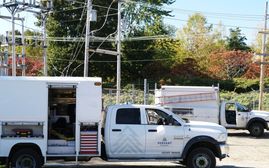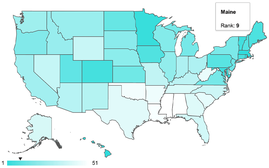Governor candidates all tout business growth, but strategies vary
Maine's next governor will face abundant challenges, when it comes to business growth, but the economy they'll inherit looks very different from what Gov. Paul LePage faced when he entered Blaine House in January 2011.
Maine's economy is healthier than it was eight years ago, though much of the state's economy is fueled by southern Maine. The labor shortage is only partly a product of a strong economy; an aging workforce and static population growth will still be here even when the economic cycle inevitably turns downward.
It's easy for a candidate to tout job growth and streamlined regulations, but what are the specific plans to make those things happen? We looked at the four candidates and their proposals to grow the economy. The election is Nov. 6.
Shawn Moody, Republican, has a plan built around cutting red tape and a focus on recruiting and retaining companies:
- “Perform a comprehensive review of all government red tape with the goal of increasing speed of permitting, reducing fees and eliminating duplication;
- “Create a jobs 'customer service hotline' so that potential job creators and Maine businesses ... can get immediate responses from state government;
- “Structure a governor's initiative on regulatory reform with existing staff to address red tape;
- “Conduct entry and exit interviews with businesses both moving to Maine and those leaving so we can address what is working well with, and what is inhibiting, job and economic growth;
- “Focus on recruiting, and retaining, businesses which pay strong, competitive wages.”
Janet Mills, Democrat, urges the creation of a small business accelerator and incentive programs:
- “Create the small business accelerator to serve as a one-stop shop for businesses and start-ups;
- “Launch the job growth loans program to provide 18 months of no-interest loans for small businesses to finance adding a new employee;
- “Establish the welcome home program to help former and future Mainers to bring their current job to Maine to work remotely and live here;
- “Provide the rural workplace grant to help communities convert a downtown building into a co-working space with high-speed broadband.”
Alan Caron, independent, says we need to spend less time trying to attract jobs from outside the state and more time “growing them here, from the ground up.” Tax breaks in Maine have largely been tied to big companies — a “dismal failure,” he argues. Instead, tax investment should be made in “promising small companies that are poised to grow.”
He also says Maine should protect and strengthen its brand: “Our brand is our most valuable asset, and it must be protected at all costs. It is the ticket to the next generation of startups that will become tomorrow's L.L. Bean, Poland Spring, Tom's of Maine, Stonewall Kitchen, BIW or Cianbro.”
Terry Hayes, independent, says Maine needs to:
- “Build on our assets and strengths;
- “Take into account regional challenges and opportunities;
- “Focus our university system's research, innovation, and workforce and economic development efforts;
- “Align the state's tax code with our 21st century economy;
- “Complement and coordinate with the efforts of Maine businesses and entrepreneurs.”













Comments